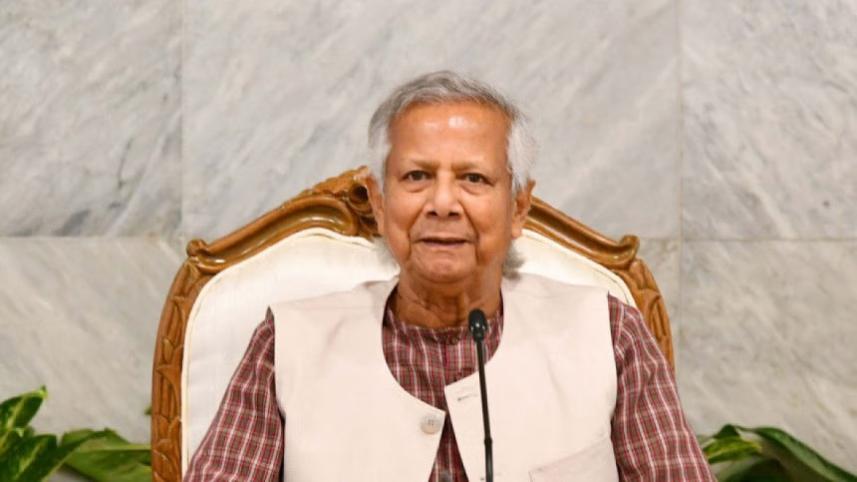Yunus calls for self-reliance as businesses seek LDC delay

Three business leaders yesterday once again urged Chief Adviser (CA) Professor Muhammad Yunus to defer Bangladesh's graduation from the group of least developed countries (LDCs) by at least three years from November 2026 to allow better preparation.
They made the demand at a meeting on the progress of graduation preparedness and the implementation of a "Smooth Transition Strategy" (STS) held at the CA's office in Dhaka, where most of his cabinet colleagues were present.
Business representatives have repeatedly called for a deferment of the LDC graduation over the past few months, arguing that they are not yet ready for a smooth transition.
"We have again requested the government to defer the graduation, as we need more time to prepare," said Mahmud Hasan Khan, president of the Bangladesh Garment Manufacturers and Exporters Association (BGMEA).
"There are some issues related to commerce and finance that need to be improved for a smooth graduation and for the implementation of the STS, which is the roadmap for LDC graduation," he said.
Talking to The Daily Star over the phone, he pointed out that two critical factors — the ease of doing business and the cost of doing business — require significant improvement, which would take at least three years of preparation.
"Even now, the ease of doing business cannot truly be achieved because of complexities in customs procedures," he added.
"Secondly, the bank interest rate remains high, which poses a major challenge for businesses in the country," Khan said.
Echoing Khan's views, Dhaka Chamber of Commerce and Industry (DCCI) President Taskeen Ahmed said the private sector is not afraid of graduation, but there are challenges that require at least three more years of preparation.
"The progress in implementing the STS is very slow, and Bangladesh has not been able to sign any major trade agreements with key trading partners yet, except for a preferential trade agreement with Bhutan," Ahmed said.
He added that the industrial sector continues to suffer from an energy crisis, weaknesses in the banking sector, and logistical challenges.
At the meeting, Bangladesh Association of Pharmaceutical Industries (BAPI) President Abdul Muktadir highlighted the potential benefits for the pharmaceutical sector if the graduation were deferred for at least three years.
At a press briefing at the Foreign Service Academy in Dhaka after the meeting, the CA's Press Secretary, Shafiqul Alam, said Professor Yunus wants to ensure a smooth transition before Bangladesh graduates from the LDC category.
The CA emphasised that the government's priority is to achieve graduation without dependence on others.
He urged all sectors to prepare for a self-reliant and sustainable transition as Bangladesh gears up for graduation.
Quoting Yunus, Alam said, "We must not depend on others. We have to stand on our own feet and avoid all forms of dependency. It must be clear to us that we do not want to depend on others anymore."
"Whatever the deadline, we must become self-reliant. To be self-reliant, we must use our intelligence, work hard, and keep striving," he quoted Yunus as saying.
"Even if it is difficult, there is joy in this struggle. When we talk about a new Bangladesh, it means a self-reliant Bangladesh," he added, quoting Yunus.
By the end of last month, Yunus requested an assessment from UN Under-Secretary-General Rabab on Bangladesh's readiness for graduation.
The UN agreed to support the assessment, which is expected to begin within a month and conclude by mid-January 2026.
Alam added that "the meeting was informed that the new import policy for 2026–2028 will be announced soon."



 For all latest news, follow The Daily Star's Google News channel.
For all latest news, follow The Daily Star's Google News channel.
Comments